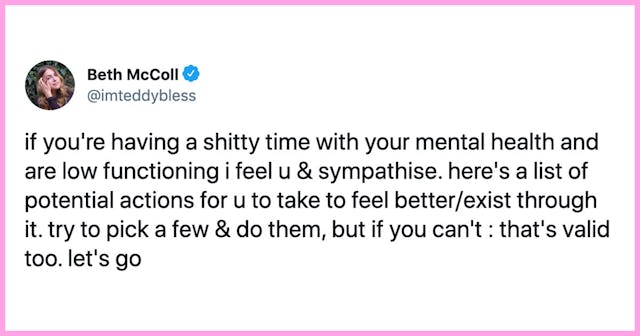Powerful Twitter Thread Outlines ‘Baby Steps’ To Take When You're Struggling With Your Mental Health

If you live with depression, anxiety, OCD, PTSD, or another mental health condition, you’ve probably been the recipient of (unsolicited) advice. From medication and therapy to diet and exercise, everyone believes they know how to treat these conditions. Eve-ry-one. And while there is something to be said about each of these action items — I see a psychologist every week and take multiple pills a day; I also run excessively, logging more than six dozen miles each month — some of the best ways to manage mental illness are also the simplest. They are tangible baby steps. Case in point: In a recently resurfaced Twitter thread, advice columnist and writer Beth McColl explains that sometimes the best things to do in crisis are also the smallest.
“If you’re having a shitty time with your mental health and your low functioning i feel you,” McColl wrote. “[H]ere’s a list of potential actions for [yo]u to take to feel better/exist.”
“Stand up & stretch,” she continued. “And take [yo]ur time with it. Plug in your phone & laptop to charge. Change out of the clothes & underwear [yo]ur currently wearing. Doesn’t matter if [yo]u take off one set of pyjamas and put another set on. Drink an entire glass of water. Pee. Wash [yo]ur face. Address your most immediate physical pains/discomforts. If you have a headache, take medicine & hydrate. If you have any cuts, clean & cover them. If you can eat: eat. If not, brush your teeth, chew some gum or even just swig some mouthwash. You’ll feel more human for it.”
McColl also suggests handling other “basic” tasks.
“Catch up on basic social maintenance stuff… let your partner or close friends/family know how you’re doing. Make a doctor’s appointment… tell yourself reassuring things. For example, ‘right now is absolute shit, yes, but eventually I’ll have the skills to survive. I’m moving in the right direction even when it feels like I’m stuck…’ and do [yo]ur skincare routine.”
Literally, wash your face. Why? Because the act will make you feel cared for and cleansed. It will make you feel decent and human.
Of course, to some, these suggestions may seem absurd. I mean, plugging in your phone? Taking medicine? Going to the bathroom? These are bare minimum tasks. They require little effort, at least in theory. They are basic. But when you’re in the midst of a mental health crisis, the smallest matters can seem monumental. Showering hurts. Eating is hard, and working or cleaning is damn near impossible. I would know.
When I’m depressed, I struggle to sit up or stand up. Getting out of bed is a chore. Doing my (super short) hair is impossible, and brushing my teeth is tough. It actually hurts. But what hurts most is how I feel not being able to accomplish said tasks, i.e. my “laziness” makes me feel worse. I feel like a fuck up. A loser. A failure. My inability to perform the most menial tasks exacerbates that voice in my head. The depressed ones which tell me I am helpless and hopeless. But by focusing on McColl’s list, I am able to take baby steps toward my recovery.
Accomplishing even the little things, like those McColl mentions, helps me feel more alive and in control.
I am not alone. McColl’s original post garnered hundreds of thousands of likes and was shared nearly 50,000 times because people got what she was saying. They felt validated and understood. Many followers thanked McColl, writing things like “thanks this really helped… i basically had a breakdown earlier and saw this so i washed my face and ate my favorite food.”
One simply said “thank you. This thread made me feel less alone.”
And others added their own bits of advice, suggesting people do things like stay hydrated and/or go on a walk. “Go outside and take a walk. The fresh air and exercise will do wonders for your mood.”
That said, it’s important to note that if you are in the midst of a depressive episode or mental health crisis, you may need external help. While these small changes can help you survive the moment, the power of (good) therapy is unparalleled. For some, like myself, medication is also essential. But taking life one minute, one moment, and one action at a time when you’re struggling can be life-altering. Sometimes, just being and breathing is enough.
If you or someone you love is struggling with your mental health, know this: There is both help and hope. Text “HOME” to 741-741 to immediately speak with a trained crisis counselor, call the National Suicide Prevention Lifeline at 1-800-273-8255, or visit the Substance Abuse and Mental Health Services Administration’s website for general information on mental health and how you can locate treatment services in your area.
This article was originally published on